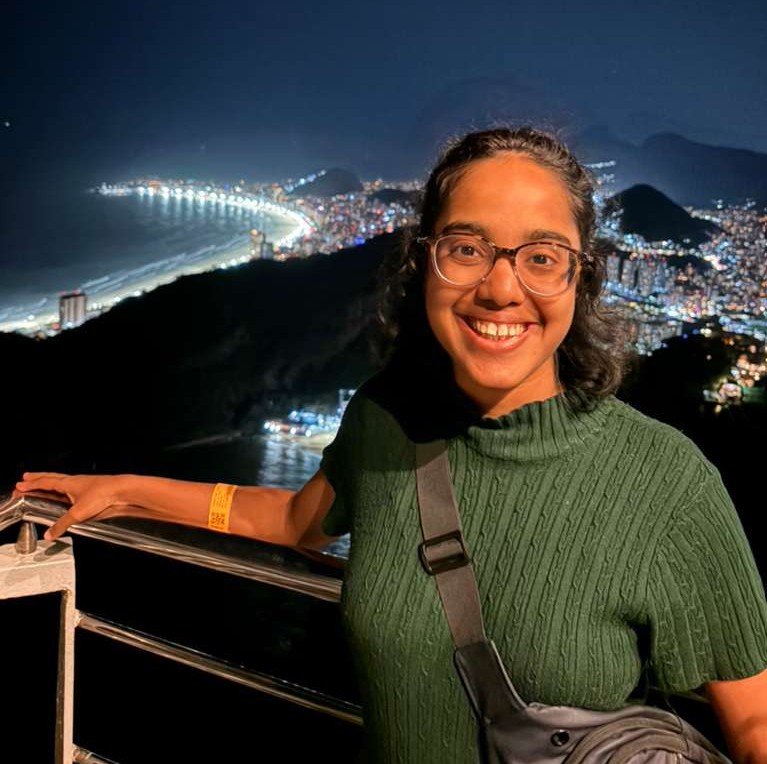October 23, 2025

Bhagyashree Prabhutendolkar
Sometimes, Baret mornings surprise you in the most unexpected ways.
We were at BRIC, ready for another inspiring session in our Morning Program — pens out, coffee cups half-finished, minds open. And then suddenly, the lights went out. A hush filled the room and in the darkness, a woman walked in with a guitar, her voice rising softly but powerfully. That’s how we met Simone White, a musician whose songs transported us to an evocative universe of human emotions that day.
Baret is known for bringing some of the world’s most remarkable individuals to share their journeys with us—and this speaker was one such gift. Simone’s music has taken her across the world — from Hawaii to Los Angeles, London to New York. With seven beautiful albums, including I’m the Man and Silver Silver, her voice has that rare quality of making you stop and feel something you didn’t know you needed to.
As she sang, you could sense a quiet shift in the room. As she began to play, something stirred within all of us and for the first time, even though we all came from completely different backgrounds, countries, cultures, and languages, the music moved us all with the same, raw human emotions. Somehow as we smiled and shared tears at the same time as she played her famous song, “The American War,” we realised how deeply music can connect, stir and heal humans.
During the talk, Simone shared a lot of personal insights about her songwriting process. She shared how songwriting is not always about controlling or forcing the lyrics to come through— but rather it’s more about letting go.
“You won’t always know what you’re writing or why,” she said. “But give yourself the freedom to sound ridiculous. You need that space to make mistakes.”
Some of her songs, she said, take just fifteen minutes. Others take weeks. “The key,” she smiled, “is to trust the process. Don’t kill an idea before it’s even born.”
One of the most powerful parts of her talk was when she spoke about the link between art and pain. Catherine, a fellow scholar from Cyprus, asked whether artists need to suffer to create something meaningful as art is often correlated with pain and melancholy.
Simone’s reply was unforgettable:
“You don’t have to suffer to make good art. But you do need to feel the world’s suffering.”
She admitted that there were times she didn’t write at all because she felt hopeless — but returning to music helped her heal. “Music is a way to process what I feel,” she said. “To be present to my pain, and to keep going.” As artists, she reminded us, we feel the world deeply—sometimes too deeply. And yet, through that depth comes healing.
I asked her about how music can connect people from such different backgrounds and her answer stayed with me:
“Music is powerful. We’ve forgotten that it’s our birthright to sing, to dance, to make art. Everyone is an artist. A hundred years ago, every family had a piano and people gathered together to sing and play music. Music can heal the world and bring us back to our raw, emotional selves.”
She also talked about her songwriting style — how she usually starts with lyrics before melody. “I love the puzzle of words,” she said. “Even when I’m not writing, my subconscious is working on them. Especially in the moments when I am taking a walk or drifting off to sleep, the music just comes up in sudden, unexpected ways and it evolves again in quiet moments. That’s why I’d never give that job to a machine or AI. The way the lyrics come out of you — it’s such a human thing.”
And when someone asked how she navigates expressing political views through her music, Simone was honest:
“There’s always been pressure to watch what you say — and now, even more so. I just try to stay true to what feels right. I don’t want to be famous for the wrong things.”
By the end of the session, the entire room felt lighter — as if something had shifted in the air. Simone had reminded us that being an artist is not about perfection; it’s about honesty, courage, and trusting in the flow. Our fellow scholars were left inspired and sparked by what goes on behind the scenes in making good music and we were privileged to have Simone share that creative process with us in the most unfiltered way.
One of my fellow scholars, Paula Garcia Garciduenas from Mexico, put it beautifully afterward:
“Simone White’s talk was incredibly inspiring. Her acoustic sound and voice express powerful messages about the world we live in. Talking to her made me believe more deeply in my own creative instincts and pursuing music as a career.”
Simone White reminded us that to create, to sing, to write, to live—is to chase light every day, and be reborn in its glow. That morning, the lights had gone out—but somehow, we all walked out carrying a little more light within us.
It still feels so surreal that we get to experience so many such inspiring sessions every morning as Baret Scholars.

